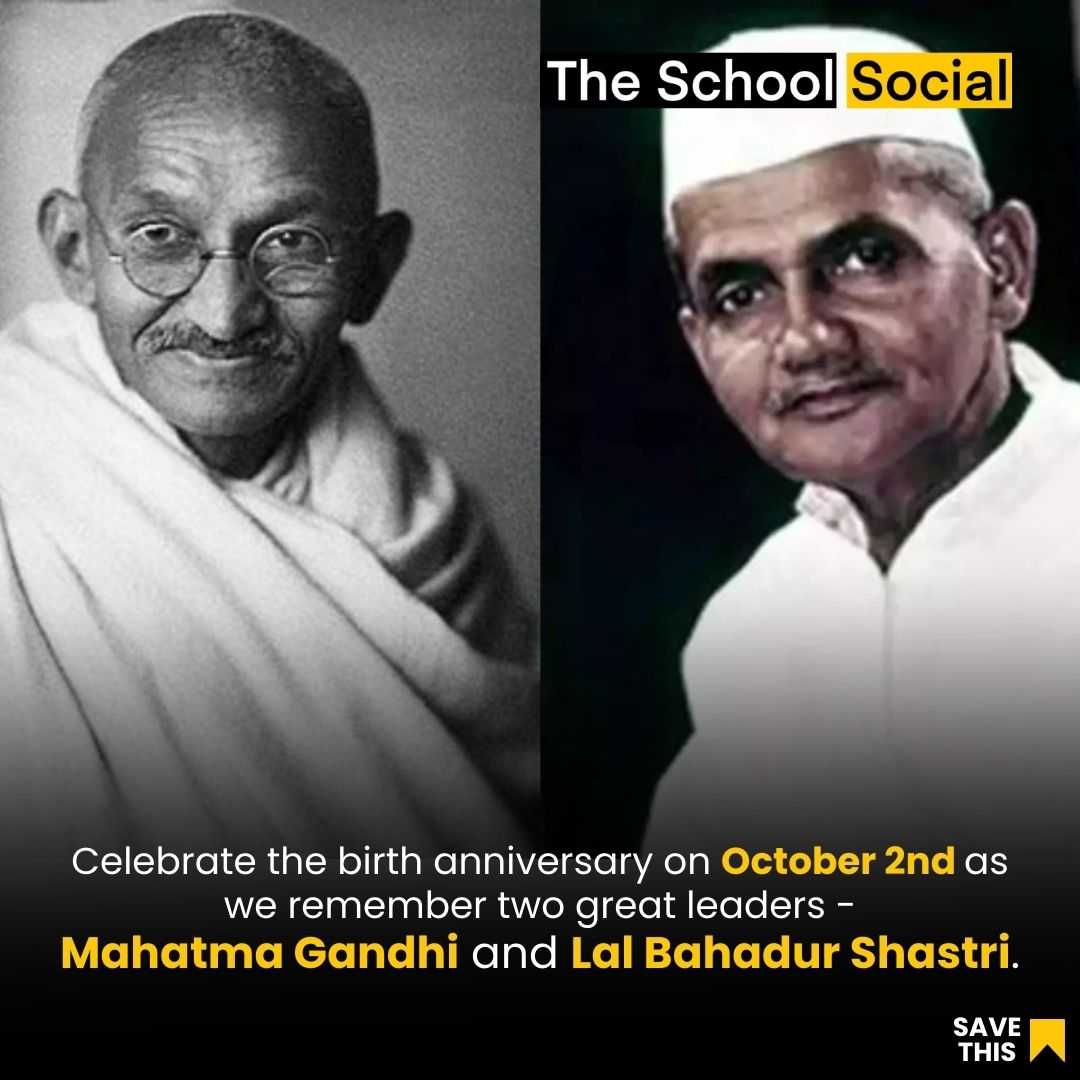2nd Octuber - Birth Anniversary of Gandhi JI and Lal Bahadur Shastri Ji
October 2nd is indeed the birth anniversary of two prominent Indian leaders: Mahatma Gandhi and Lal Bahadur Shastri. Mahatma Gandhi (Mohandas Karamchand Gandhi): Born on October 2, 1869, he is renowned as the leader of the Indian independence movement against British rule. His philosophy of non-violent resistance, or Satyagraha, influenced civil rights movements worldwide. Lal Bahadur Shastri: Born on October 2, 1904, he served as the second Prime Minister of India. He is known for promoting the White Revolution—a national campaign to increase the production and supply of milk—and for his leadership during the 1965 India-Pakistan war. His famous slogan "Jai Jawan Jai Kisan" (Hail the soldier, Hail the farmer) highlights his focus on the country's defense and agriculture.
Gandhi Ji- The Father of the Nation
Mahatma Gandhi (Mohandas Karamchand Gandhi) - The Father of the Nation, affectionately known as Bapu Ji, was born on 2nd Oct,1869 in Porbandar, Gujarat. He studied in London and later practised law in South Africa. Witnessing harsh treatment there, he initiated a non-violent Civil Disobedience Movement.
Gandhi Ji Returning to India
After spending over two decades in South Africa, Mahatma Gandhi returned to India in 1915. His experiences and success with non-violent resistance in South Africa had already garnered him a reputation, and he was welcomed warmly by the Indian public. Upon his return, he spent a year traveling across India to understand the conditions of the people and the challenges they faced. He then joined the Indian National Congress and quickly rose to prominence in the Indian freedom struggle. Gandhi's methods of non-violent protest and civil disobedience became the cornerstone of the Indian independence movement, leading to several significant campaigns, including the Non-Cooperation Movement, the Salt March, and the Quit India Movement. His leadership and philosophy played a crucial role in India's eventual independence from British rule in 1947.

Why is Gandhi Remembered Throughout the World?
Non-Violent Resistance: His peaceful protests inspired change globally. Advocacy for Human Rights: He championed equality and fought oppression. Simplicity and Self-Sufficiency: His minimalist lifestyle inspired sustainable living. Global Influence: Gandhi's ideas on nonviolence and social justice continue to impact movements and leaders worldwide.
Role of Mahatma Gandhi in the Freedom Movement
Mahatma Gandhi played a pivotal role in the Indian freedom movement, employing non-violent resistance and civil disobedience to challenge British rule. His leadership and strategies were instrumental in mobilizing millions of Indians to participate in the struggle for independence. Here are some key aspects of his role in the freedom movement: Champaran and Kheda Satyagraha (1917-1918): Champaran: Gandhi led a successful campaign against the oppressive policies imposed on indigo farmers in Champaran, Bihar. His efforts forced the British authorities to agree to reforms. Kheda: In Kheda, Gujarat, Gandhi supported peasants who were unable to pay taxes due to crop failure. The non-violent protest led to the suspension of the tax collection. Non-Cooperation Movement (1920-1922): Gandhi called for a nationwide non-cooperation movement, urging Indians to boycott British goods, institutions, and titles. The movement saw widespread participation and significantly weakened British control. The movement ended abruptly after the Chauri Chaura incident, where a violent clash led to the death of several policemen, prompting Gandhi to call off the campaign as he insisted on non-violence. Salt March (Dandi March) (1930): In protest against the British monopoly on salt, Gandhi led the famous 240-mile Salt March from Sabarmati Ashram to the coastal village of Dandi. The act of making salt at the end of the march became a powerful symbol of resistance and inspired widespread acts of civil disobedience across the country. Civil Disobedience Movement (1930-1934): Following the Salt March, the Civil Disobedience Movement saw millions of Indians defy British laws, leading to mass arrests and protests. Gandhi's strategy of non-violent resistance put immense pressure on the British government. Round Table Conferences (1930-1932): Gandhi represented the Indian National Congress at the Round Table Conferences in London, where he demanded complete independence for India. Although the talks did not yield immediate results, they highlighted India's demands on the global stage. Quit India Movement (1942): During World War II, Gandhi launched the Quit India Movement, calling for an immediate end to British rule. The movement led to mass protests, strikes, and demonstrations, despite severe repression by the British authorities. Gandhi and many other leaders were imprisoned, but the movement galvanized Indian society and brought the demand for independence to the forefront. Role in Unifying Diverse Groups: Gandhi worked tirelessly to unite various factions within India, including Hindus, Muslims, Sikhs, and others, fostering a sense of national unity. He also championed the rights of marginalized communities, such as the Dalits, whom he called "Harijans" (children of God). Negotiations for Independence: In the final years leading up to independence, Gandhi played a crucial role in negotiating with British officials and Indian leaders, advocating for a peaceful transition of power and opposing the partition of India and Pakistan. Despite his opposition, the partition occurred, leading to widespread violence and displacement.
Lal Bahadur Shastri JI - India's Second Prime Minister
Lal Bahadur Shastri, born on October 2, 1904, was a prominent Indian political leader who served as the second Prime Minister of India from 1964 to 1966. His tenure, though brief, was marked by significant contributions to India's domestic and foreign policy.
After independence, Shastri held various key positions in the Indian government, including Union Minister for Railways, Minister of Transport and Communications, Minister of Commerce and Industry, and Home Minister.







